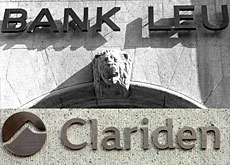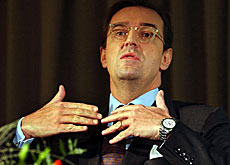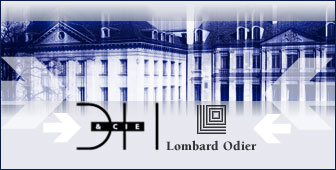“Super bank” must evolve to flourish

Switzerland's second-largest bank said this week it will merge four private banks and a securities dealer to create a new operation called Clariden Leu.
Credit Suisse’s proposed new consolidated private bank is aimed at attracting more wealthy clients. But according to an expert, the bank must build up outposts in Asia if it is to achieve this aim.
The new enterprise will take its name from the two largest institutions to be merged, Bank Leu and Clariden Bank. Securities dealer Credit Suisse Fides, Bank Hofmann and Banca di Gestione Patrimoniale will also be fused into the conglomerate.
The deal is subject to shareholder and regulatory approval.
If approved, Clariden Leu will become the fifth largest private bank in Switzerland, created specifically to manage the wealth of rich clients, particularly in Asia.
“Clariden Leu is targeting wealthy clients. Thanks to the amalgamation of the individual units all clients will have access to an expanded range of investment products and specialized services,” F. Bernard Stalder, current chief executive of Clariden Bank and the designated CEO of Clariden Leu, said in a statement.
But size is not everything, warns Professor Hans Geiger of Zurich University’s Swiss Banking Institute.
“I’m not so sure that it is better to invest your money in an institution with 200 employees rather than one with ten. It is the quality of fund management that counts, not sheer size,” he told swissinfo.
Reaching out
“The main advantage is that Clariden Leu would have a bigger sales force that brings a better capability to reach out to potential customers. But if they do not build outposts in the likes of China, Singapore and Hong Kong, the new bank will not be any more attractive than before.”
Geiger believes the time is ripe to seek an expansion into the wealth management market with the rapid development of Asian markets.
But Clariden Leu will face stiff competition to attract cash, not just from traditional rivals such as Switzerland’s largest bank UBS, but from new sources as well.
“After a few difficult years it looks as if business may be good in the near future. The golden old days will not return easily because European economies are not growing as they used to, so fund managers will need to look elsewhere,” Geiger said.
“Competition will be more intensive than ever before with the development of independent asset managers, electronic channels and hedge fund specialists.”
Switzerland should remain an attractive place to invest funds mainly due to the poor performance of the German and Italian economies, Geiger added.
The last big merger of private banks was between Geneva’s Lombard Odier and Darier Hensch in 2002. Geiger does not expect a rash of new mergers in the near future, despite market speculation that several other banks have set their sights on alliances.
“I do not expect mass consolidation, but the trend that was forecast 20 years ago may pick up slowly,” he said.
swissinfo, Matthew Allen in Zurich
Clariden Leu will become the fifth-largest private bank in Switzerland behind UBS, Credit Suisse, HSBC and Julius Bär. The merger is expected to be completed by the end of 2007.
The new bank’s headquarters will be located at the present HQ of Bank Leu in Zurich. Bank Leu CEO F. Bernard Stalder has been proposed as the first Clariden Leu CEO with Walter Berchtold, current CEO of Credit Suisse’s private banking arm, nominated as chairman
Clariden Leu will have five branches in Switzerland plus others in 17 other locations. The consolidation will result in about 200 job losses, mainly in IT and backroom staff, saving roughly SFr100 million a year from 2008
At the end of 2005 the five units managed SFr112 billion in private client funds and generated net profits of SFr443 million. The total workforce was about 1,800 staff
There are around 330 banks in Switzerland, many of them offering private banking services

In compliance with the JTI standards
More: SWI swissinfo.ch certified by the Journalism Trust Initiative




You can find an overview of ongoing debates with our journalists here. Please join us!
If you want to start a conversation about a topic raised in this article or want to report factual errors, email us at english@swissinfo.ch.